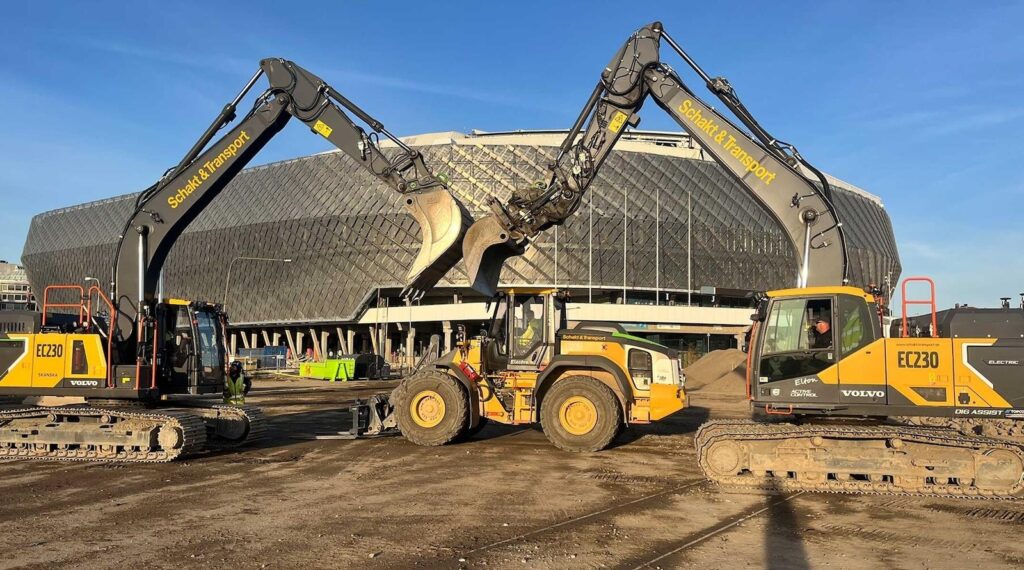
Sign up for daily news updates from CleanTechnica on email. Or follow us on Google News!
Electric heavy-duty construction equipment is becoming all the rage, becoming one of the hot new areas of the electrification era. Now, a worksite in Sweden, where there’s an extra focus on achieving freedom from fossil fuels, has reached 50% electrification. In particular, this is thanks to Volvo CE electric machines.
This is up from 10% electrification two years ago. Also, Volvo CE notes that that first phase “not only proved its feasibility but also delivered numerous additional benefits.” Overall, this electrification project is supposed to be completed sometime in 2025. “Three electric machines from Volvo CE, including two Volvo EC230 Electric crawler excavators and one L120H Electric Conversion wheel loader, are working to lower the ground, excavate approximately 68,000m³ of soil and rock, fill in a work tunnel, and prepare the area for utility systems” at the moment. Those three machines have the names Electra, Ellen, and Elton, showing how much they’ve endeared themselves to the team — and, of course, the alliteration must be on purpose. Two electric trucks with trailers are joining now. Names are not as yet known. Also being added are an electric powered sorting tool, an electric compaction tool, and some hand-operated electric machines.
“The redevelopment of the ‘Slakthusområdet’ or meat-packing area in central Stockholm is capturing attention for its commitment to sustainability and innovation. The project is a testbed for more sustainable construction and demonstrates the enormous and often untapped potential of fossil-free procurement contracts as a driver for change. In the first phase — set to conclude in early 2025 — the project has achieved CO₂ savings of 2,759 tons as of June 2024, a feat that earned it the ‘Sustainable Construction Project of the Year’ award at the annual Swedish Green Building Awards. Looking ahead to the second phase, the climate ambitions are even more progressive — a challenge that Volvo CE, Skanska and Swecon are fully prepared to deliver,” Volvo CE writes.
“Stockholm City aims to be climate positive by 2030 and fossil-fuel free by 2040. Fossil-free requirements in contracts play a crucial role in reaching these targets. In a groundbreaking move, for the second phase of the project Stockholm City set carbon calculations at the tender stage, including practical implementation details. This sets a new standard for sustainable accountability in construction. Skanska secured the contract by demonstrating proven sustainability results, the capability to deliver the plan, and presenting a proposal that aligned with Stockholm’s ambitious goals.
“In this new phase of the project, the aim is to reduce emissions even further by going under the target of 3.5 tons of CO₂ per SEK 1 million turnover. This is a dramatic decrease on the 11 to 29 tons typically emitted in similar projects. The increase in electric operation also reflects rapid advancements in electric machine technologies.”
Stockholm wants to actually be climate positive by 2030.
In terms of the leading Stockholm City project, there are 3 key targets for the second phase of development:
- 100% fossil-fuel free site operations through the use of HVO100 fuel and increasing electric operation from 10% to 50%.
- The use of climate-reduced concrete.
- Delivering on the carbon calculation.
“The first phase showed the effectiveness of electric machines in performing tasks while significantly reducing CO₂ emissions. This is invaluable for city center projects to help municipalities meet their emission reduction targets and enhance air quality, as well as reducing noise levels for everyone’s benefit,” Fredrik Tjernström, Head of Electromobility Solutions Sales at Volvo CE, says.
“When municipalities like Stockholm City prioritize carbon reduction in contract awards, it not only sets an inspiring precedent for other regions, but also drives innovation across the construction industry. This proactive approach creates a ripple effect throughout the entire value chain, pushing all stakeholders to explore new possibilities and expand the boundaries of what can be achieved in sustainable construction,” Anna Göransdotter, Project Manager at Skanska, adds.
Chip in a few dollars a month to help support independent cleantech coverage that helps to accelerate the cleantech revolution!
Have a tip for CleanTechnica? Want to advertise? Want to suggest a guest for our CleanTech Talk podcast? Contact us here.
Sign up for our daily newsletter for 15 new cleantech stories a day. Or sign up for our weekly one if daily is too frequent.
CleanTechnica uses affiliate links. See our policy here.
CleanTechnica’s Comment Policy

